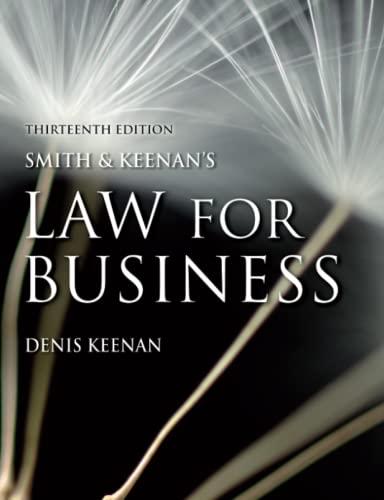Question
Need help responding to one of my peers discussion post. How would you respond with meaningful / analytical thoughts (more than that you agree /
Need help responding to one of my peers discussion post. How would you respond withmeaningful / analyticalthoughts (more than that you agree / disagree)
The discussion question my peer responded too below:
Law enforcement agencies must address a significant amount of activities and events in their policies and procedures. For example, the Commission on Accreditation for Law Enforcement Agencies, Inc. (CALEA) provides this list[1] of 458 standards that are reviewed during the accreditation process.
While the need for many of these policies have existed for a long time, such as Use of Force, operating motor vehicles, and uniforms and appearance, new issues have developed that require new policies and revisions to old policies.
One of the most significant developments is rise of social media. These applications have become almost a mandatory part of life, both for the agencies and the individual officers.
For this discussion board, find the social media policies of at least two different agencies.
- Compare the policies on the following issues: -Restrictions on the content of posts. What kind of material are individuals not allowed to post? Is there a difference between what individuals can post on or off duty? -When are individuals permitted to post? -Does the agency permit individuals to post pictures of themselves in uniform, or of police cars and the like? What about identifying themselves as a police officer?
- Provide your opinion on each of the previous aspects of the policy. Explain which policy you think has the better provisions for each issue, and why.
- Do you think the provisions of the policies are good? Explain how you reached this answer. How do you think the policy could be improved?
My peer response that I need to reply to below:
Comparing the social media policies outlined by the Galveston Police Department and the Federal Bureau of Investigation (FBI) sheds light on various aspects of content restrictions, posting permissions, and guidelines for sharing images and identity.
Both policies emphasize restrictions on content, prohibiting the dissemination of sensitive information, derogatory remarks, or discriminatory material. However, the Galveston policy extends this restriction to off-duty conduct, maintaining consistency regardless of duty status. In contrast, the FBI policy emphasizes the importance of safeguarding sensitive information but does not explicitly address off-duty conduct, potentially leaving room for interpretation.
Regarding image sharing, both policies discourage the posting of images in uniform or of agency equipment, prioritizing security concerns. However, the FBI policy takes a more stringent approach, advising against any form of information sharing on social networking sites due to security considerations.
My opinion of the provisions in these policies, I believe the Galveston Police Department's policy has better provisions, particularly in terms of maintaining consistency in content restrictions regardless of being on or off duty. Both policies have a commitment to safeguarding sensitive information and upholding professionalism. To further improve these policies, agencies could consider providing more detailed guidance on posting times and offer training on social media best practices to ensure compliance and effectiveness.
Step by Step Solution
There are 3 Steps involved in it
Step: 1

Get Instant Access to Expert-Tailored Solutions
See step-by-step solutions with expert insights and AI powered tools for academic success
Step: 2

Step: 3

Ace Your Homework with AI
Get the answers you need in no time with our AI-driven, step-by-step assistance
Get Started


